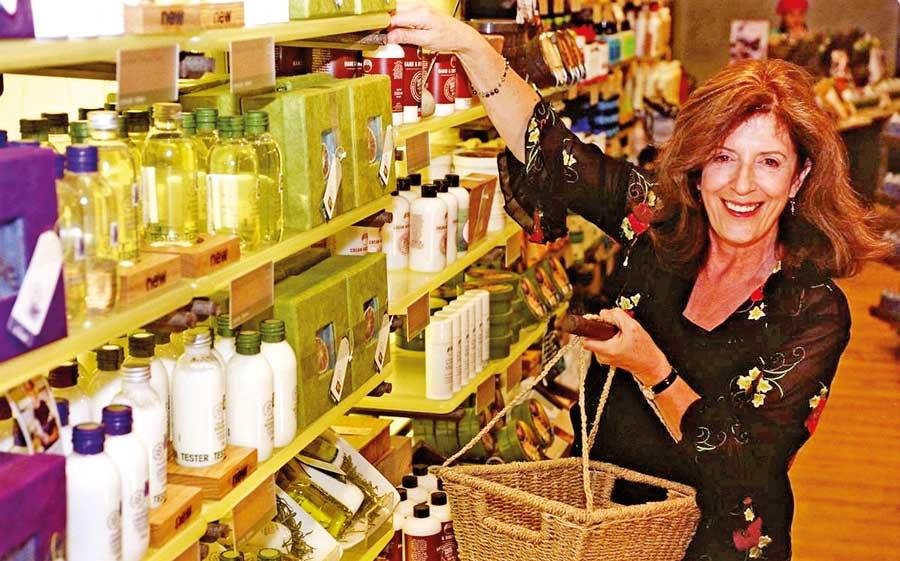09 Dec 2019 - {{hitsCtrl.values.hits}}

Part 60
 Dame Anita Roddick (October 23, 1942 – September 10, 2007) was a British businesswoman, human rights activist and environmental campaigner, best known as the founder of The Body Shop, a cosmetics company producing and retailing natural beauty products that shaped ethical consumerism.
Dame Anita Roddick (October 23, 1942 – September 10, 2007) was a British businesswoman, human rights activist and environmental campaigner, best known as the founder of The Body Shop, a cosmetics company producing and retailing natural beauty products that shaped ethical consumerism.
The company was one of the first to prohibit the use of ingredients tested on animals and one of the first to promote fair trade with Third World countries.
Roddick was involved in activism and campaigning for environmental and social issues, including involvement with Greenpeace and The Big Issue. In 1990, Roddick founded Children on the Edge, a charitable organisation, which helps disadvantaged children in Eastern Europe and Asia.
Roddick opened the first Body Shop in 1977 with the aim of making an income for herself and her two daughters while her husband was away in South America. She had an idea of providing quality skin care products in refillable containers and sample sizes, all marketed with truth rather than hype.
She opened her second shop six months later. On her husband’s return, he joined the business. By 1991, the Body Shop had 700 branches and Roddick was awarded the 1991 World Vision Award for Development Initiative.
In 1993, she told Third Way Magazine: “The original Body Shop was a series of brilliant accidents. It had a great smell; it had a funky name. It was positioned between two funeral parlours – that always caused controversy. It was incredibly sensuous. It was 1976, the year of the heat wave, so there was a lot of flesh around. We knew about storytelling then, so all the products had stories. We recycled everything, not because we were environmentally friendly but because we didn’t have
enough bottles.
Anyway, we found it to be a good idea. What was unique about it, with no intent at all, no marketing nous was that it translated across cultures, across geographical barriers and social structures. It wasn’t a sophisticated plan, it just happened like that.”
In 1997, Anita developed the Body Shop’s most successful campaign ever, creating Ruby, the size 16 doll, who was thought to bear a passing resemblance to Barbie. The campaign evolved from a new strategic positioning developed by ethical communications consultancy Host Universal, who created the image of the naked red-haired doll, hands behind her head and wind in her hair that became the embodiment of the campaign.
By 2004, the Body Shop had 1980 stores, serving over 77 million customers throughout the world. It was voted the second most trusted brand in the United Kingdom and 28th top brand in the world.
On March 17, 2006, L’Oréal purchased Body Shop for £652 million. This caused controversy because L’Oréal is involved in animal testing and because the company is part-owned by Nestlé, which has been criticised for its treatment of Third World producers.
Roddick addressed it directly in an interview with The Guardian, which reported that “she sees herself as a kind of ‘Trojan horse’, who by selling her business to a huge firm will be able to influence the decisions it makes. Suppliers who had formerly worked with the Body Shop will in future have contracts with L’Oréal and whilst working with the company 25 days a year Roddick was able to have an input into decisions.”
Roddick died of acute brain haemorrhage on September 10, 2007. As promised earlier, she left her estate to charities rather than to her friends and family.
Roddick was known for her campaigning work on environmental issues and was a member of the Demos think tank’s advisory council. Children on the Edge (COTE) is an organisation that Roddick founded in 1990, in response to her visits to Romanian orphanages. COTE’s mission is to help disadvantaged children affected by conflicts, natural disasters, disabilities and HIV/AIDS.
Roddick also wrote the book ‘Take It Personally’, which encourages equality and an end to the exploitation of workers and children in developing countries.
Lessons to be learned from Anita Roddick
1. You don’t need a business degree to become your own boss
Roddick founded The Body Shop in 1976, despite having no training or experience in starting and running a retail business. But she did have a bold solution to a problem she identified in the beauty industry. Anita’s motivations were to provide for her family and to support a cause she believed in and these motivations pushed her to transform her idea into a great business. “What this has taught me is that people with no formal business training should not be afraid of becoming their own boss – a good idea and determination can take you a long way,” she said.
2. Stand for something you believe in
Roddick had a powerful dream to introduce sustainable beauty products into the market. At that time, no-one really understood the benefits of ‘green business’ or just how popular natural products would become. But Anita knew saw a lucrative and sustainable market opportunity and she fought tirelessly to plug the gap. When you start your own company, it’s something that you could be working on day-in and day-out for years, so you need to make sure you start-up in a sector that doesn’t bore you. It’s essential to always be one step ahead of the game when you’re your own boss. Roddick said, “It is impossible to separate the company values from the issues that I care passionately about.”
3. Live a better life, build a better business
Running your own boss can enable you to decide where you work, allow you to balance your priorities better around your family or together commitments and ultimately help you to live the life you want to live.
“If you can create an honourable livelihood, where you take your skills and earn a living from them, it gives you a sense of freedom and allows you to balance your life the way you want.”
4. Go niche, go global!
The Body Shop was such a unique business that it really stood out from the crowd. The company’s target audience picked up on its old values quickly and remained loyal because the products themselves were high quality.
In fact, Anita was against spending money on advertising and instead relied on clever PR and producing products that encouraged word-of-mouth recommendation – perhaps the most influential form of marketing.
Refining your products for a niche audience enables you to target your marketing strategies more efficiently and makes it easy to position yourself as an expert in your field. “If you do things well, do them better. Be daring, be first, be different, be just.”
5. Have a unique vision
With a vision, be passionate about communicating it, even if, at first, it falls on deaf ears.
6. Mistakes make best inventions
Roddick learned by ‘doing’ – she had famously never read a book about business in her life but claimed this gave her a competitive advantage.
7. Be obsessed
Roddick’s obsession drove her business success.
8. Transparency and a commitment to corporate values are critical
These are needed for weathering harsh short-term criticism and focusing the company on its long-term goals.
9. Maintain brand loyalty
By continually innovating and refreshing products, companies can define and maintain category brand leadership.
10. Link company’s mission with its sustainability activities
These must be defined uniquely for the company. But once defined, they must be aggressively pursued to have effect.
(Lionel Wijesiri is a retired company director with over 30 years’ experience in senior business management. Presently he is a freelance journalist and could be contacted on
[email protected])
27 Dec 2024 48 minute ago
27 Dec 2024 1 hours ago
27 Dec 2024 1 hours ago
27 Dec 2024 1 hours ago
27 Dec 2024 1 hours ago